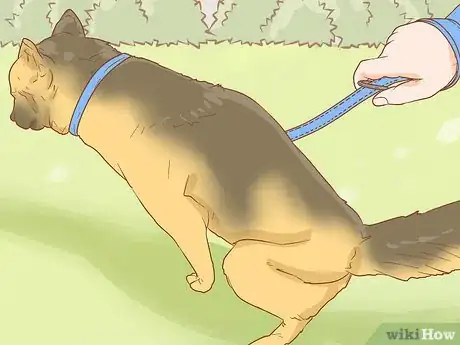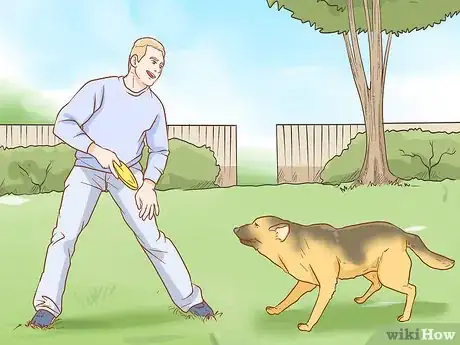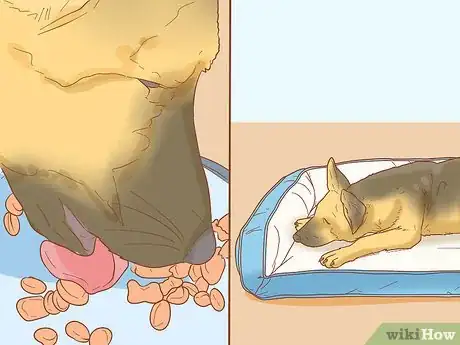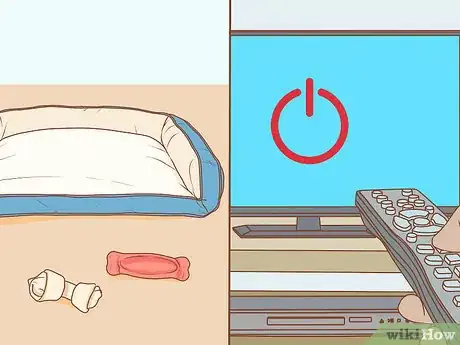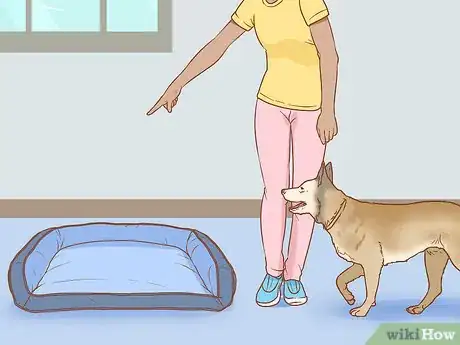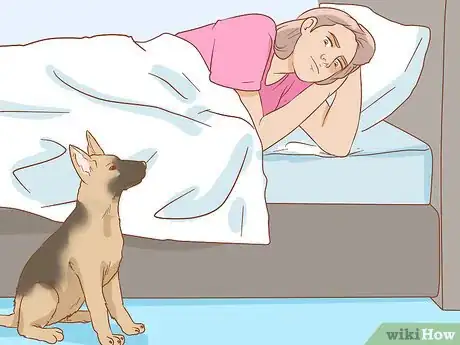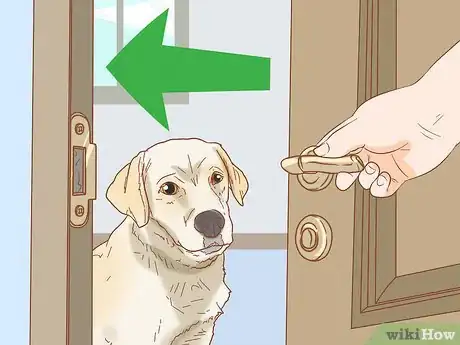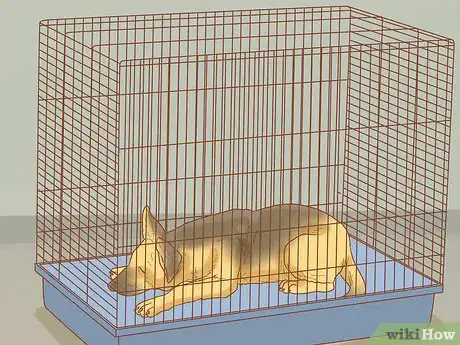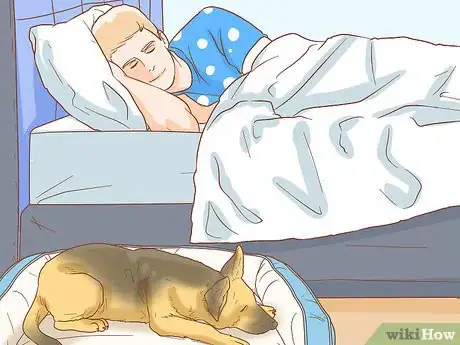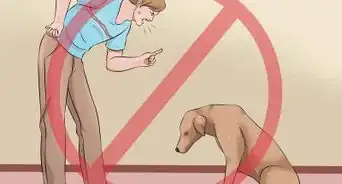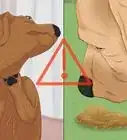This article was co-authored by Beverly Ulbrich. Beverly Ulbrich is a Dog Behaviorist and Trainer and the Founder of The Pooch Coach, a private dog training business based in the San Francisco Bay Area. She is a Certified CGC (Canine Good Citizen) Evaluator by the American Kennel Club and has served on the Board of Directors for the American Humane Association and Rocket Dog Rescue. She has been voted the best private dog trainer in the San Francisco Bay Area 4 times by SF Chronicle and by Bay Woof, and she has won 4 "Top Dog Blog" awards. She has also been featured on TV as a dog behavior expert. Beverly has over 18 years of dog behavior training experience and specializes in dog aggression and anxiety training. She has a Master of Business Administration from Santa Clara University and a BS from Rutgers University.
There are 11 references cited in this article, which can be found at the bottom of the page.
This article has been viewed 239,592 times.
Having a dog is one of the joys of many people’s lives. However, one of the downsides of dog ownership is getting awoken by a pawing, barking, or licking dog. A new pet may need some time and training to adapt to your sleep schedule. If a familiar dog has recently started to disturb your sleep, it's a good idea to have a vet rule out medical triggers.
Steps
Addressing the Root Cause
-
1Consult a veterinarian about behavioral changes. If your dog is waking you up more than it used to, a medical problem could be affecting its sleep or stress levels. Visiting a vet is an excellent first step so you can rule out this possibility, or catch problems early. Even if your pet is not sick, a vet can help you pinpoint the cause.[1]
- Any significant change in behavior or sleep schedule could be a sign of a medical problem. Difficulty eating or eliminating could point to gastric distress that keeps your dog awake.[2] If the dog wakes you up to beg for food in the night, it may be experiencing increased hunger due to diabetes or another metabolic disorder.
- Unless your dog is sick enough to be throwing up or having diarrhea and needs help getting outside, it should eventually be able to sleep through the night.[3]
-
2Commit to a good sleep schedule. A regular, predictable sleep pattern makes it easier for your dog to adapt. Do your best to go to sleep at the same time every night, and wake up at the same time every morning.
- While doggy sleep patterns are different than that of humans – they sleep up to twenty hours a day and sleep for shorter amounts of time – your dog will get used to your sleep schedule over time.[4]
- Be consistent about not giving your dog attention other than a reprimand if they attempt to wake you before you intended to get up.[5]
Advertisement -
3Respond to a dog's frequent urination. If your dog wakes you up in the night to go outside, they may have a medical problem such as a urinary tract infection or Cushing's disorder. A vet can diagnose your pet and prescribe medication to treat this problem.[6] If your vet rules these out, your dog may have a weak bladder due to old age. You can make you and your dog more comfortable by providing a pee pad.
- A dog door is another solution if you have an enclosed yard and are not concerned about dangerous wildlife.
-
4Spend more time exercising your dog. A great way to reduce the likelihood that your dog will wake you up is to tire them out before you go to sleep. You can do this by increasing the amount of time you and your dog exercise together. In the end, a sleeping dog won't be able to wake you up.[7]
- If you don't have time to exercise your dog during the day, try taking it on a short walk just before you go to bed at night.[8]
-
5Alter your dog's feeding schedule. You can also decrease the chance of your dog waking you up by changing your dog's food schedule. Ultimately, your dog might be waking you up because they're hungry or are still active because they ate really late.
- If you think your dog is waking you because they're hungry, push back dinner time an hour or two. This way, your pup's belly will be fuller for a longer time.
- If you think your dog is waking you because they're hyper from the last meal, move dinner up a little bit. Feeding your dog at 6PM might work more than feeding them at 8PM.[9]
-
6Reduce your dog's stimulation. Another reason your dog might be waking you is because they're still awake, energetic, or are just overstimulated. This can be remedied through a number of ways:
- Don't play with your dog for a couple of hours before bed.
- Don't leave toys around your dog's sleeping area.
- Turn off your TV or any music before bedtime.[10]
Training Your Dog
-
1Command your dog to sleep. Sometimes your dog will just wake you up because they’re bored or they want to play. In this case, you should command your dog to lay down and go back to sleep.
- Use a command like “lay down.” This should get your dog to stop pawing you and licking your face.
- Say your chosen command in a stern voice.
- Use the command only once.
- You may want to point to the ground as you say the command.
- Training your dog by commands might take several weeks. Don’t lose patience – your dog will eventually learn.[11]
-
2Avoid giving in to your dog. If you reward your dog with attention for waking you up, you will train them to repeat the behavior. Ignore your dog's efforts except for that single "lay down" command — even prolonged scolding can be a "reward." When it is time to get up, spend a little time on your own activities instead of walking directly to the food bowl.
- Remember, though, your dog might genuinely have to go to the bathroom. Don’t make them suffer because you want another twenty minutes of sleep.[12]
-
3Adjust your schedule for medical conditions. Depending on your dog’s general health, you may have to adjust your lifestyle, habits, and schedule to your dog’s needs. By adjusting to your dog’s needs, you’ll reduce the chance that they’ll wake you up. Consult your vet if your dog's medication or feeding schedule makes it difficult for you to sleep.
Changing Your Dog's Sleep Environment
-
1Keep your dog in another room. If you’ve tried everything and your dog still wakes you up, you may consider having your dog sleep in another room. By putting your dog in another room, you’ll make sure that you have restful sleep and your dog is undisturbed during the night.
- Make sure to provide your dog with a comfortable bed if you put them in another room.
- Be aware, keeping your dog in another room, especially if they’re already used to sleeping with you, might result in crying, barking, or a dog with hurt feelings.[13]
-
2Put your dog in a crate at night. Some dogs may find it hard to sleep without waking up their owner. This is especially true of high energy dogs that are not crated at night. A solution to this is keeping your dog in a create at night. By putting your dog in a crate, you’ll send your dog the signal that night time is sleep time, and you’ll also remove their ability to run around or disturb your sleep.
- Housing your dog in a crate at night will prevent them from jumping on you and licking you awake in the morning.
- Make sure that the crate is big enough for your dog. Dogs 0-15 pounds should have small crates, dogs 16 to 35 pounds should have medium rates, dogs 36 to 65 pounds should have large crates, and dogs over 65 pounds should have extra-large crates.[14]
-
3Let your dog sleep in the same room as you, if they didn't originally. Some dogs may bark to wake you up at night because they’re lonely or want your attention. One way to address this is to have your dog sleep in the same room as you. By moving your dog into the same room as you, you may eliminate the reason why your dog is barking and waking you up.
- Provide your dog with a crate, bed, or somewhere to sleep in your room.
- Make sure to set boundaries from the very beginning. This means creating a space and then training your dog to sleep in until you are awake.
Expert Q&A
Did you know you can get expert answers for this article?
Unlock expert answers by supporting wikiHow
-
QuestionWhere should I put my dog when it's time to go to bed?
 Beverly UlbrichBeverly Ulbrich is a Dog Behaviorist and Trainer and the Founder of The Pooch Coach, a private dog training business based in the San Francisco Bay Area. She is a Certified CGC (Canine Good Citizen) Evaluator by the American Kennel Club and has served on the Board of Directors for the American Humane Association and Rocket Dog Rescue. She has been voted the best private dog trainer in the San Francisco Bay Area 4 times by SF Chronicle and by Bay Woof, and she has won 4 "Top Dog Blog" awards. She has also been featured on TV as a dog behavior expert. Beverly has over 18 years of dog behavior training experience and specializes in dog aggression and anxiety training. She has a Master of Business Administration from Santa Clara University and a BS from Rutgers University.
Beverly UlbrichBeverly Ulbrich is a Dog Behaviorist and Trainer and the Founder of The Pooch Coach, a private dog training business based in the San Francisco Bay Area. She is a Certified CGC (Canine Good Citizen) Evaluator by the American Kennel Club and has served on the Board of Directors for the American Humane Association and Rocket Dog Rescue. She has been voted the best private dog trainer in the San Francisco Bay Area 4 times by SF Chronicle and by Bay Woof, and she has won 4 "Top Dog Blog" awards. She has also been featured on TV as a dog behavior expert. Beverly has over 18 years of dog behavior training experience and specializes in dog aggression and anxiety training. She has a Master of Business Administration from Santa Clara University and a BS from Rutgers University.
Dog Behaviorist & Trainer
-
QuestionI have a 7-year-old beagle and she whines every night waking me up. She only does this when she is sleeping with me, not any other person in my house. How can I make her stop?
 Community AnswerIgnore her. You will lose sleep for a while, but completely ignore her. Assuming she doesn't need to pee, when you wake up, say "no" firmly. If she continues, completely ignore her. If the only person she is doing this to is you, it means she knows you will do something (pet her, sweet-talk her, etc.) that she enjoys. If she receives either no attention or only negative attention (i.e., the word "no" or a scruff shake if she tries to jump on your bed), she'll stop. It'll likely take a week or two to stop the problem if you're consistent. Consistency is key.
Community AnswerIgnore her. You will lose sleep for a while, but completely ignore her. Assuming she doesn't need to pee, when you wake up, say "no" firmly. If she continues, completely ignore her. If the only person she is doing this to is you, it means she knows you will do something (pet her, sweet-talk her, etc.) that she enjoys. If she receives either no attention or only negative attention (i.e., the word "no" or a scruff shake if she tries to jump on your bed), she'll stop. It'll likely take a week or two to stop the problem if you're consistent. Consistency is key. -
QuestionMy dog is fully awake at night, and has to relieve herself. Then, she barks and goes to sleep. What should I do?
 BleakyCommunity AnswerTry working on better bathroom habits for your dog, and take her outside before her bedtime, so that she won't have to relieve herself at night. Pertaining to the barking, this may be out of boredom and frustration, so take your dog for a nice, long walk every day and see if the barking situation improves or goes away completely. Or, if you can't manage just one long walk, try to go for a couple short walks. If it's not possible to get out at all, a treadmill can be a good help.
BleakyCommunity AnswerTry working on better bathroom habits for your dog, and take her outside before her bedtime, so that she won't have to relieve herself at night. Pertaining to the barking, this may be out of boredom and frustration, so take your dog for a nice, long walk every day and see if the barking situation improves or goes away completely. Or, if you can't manage just one long walk, try to go for a couple short walks. If it's not possible to get out at all, a treadmill can be a good help.
References
- ↑ https://www.petcarerx.com/article/common-dog-sleep-disorders/896
- ↑ http://www.whole-dog-journal.com/issues/13_5/features/Dog-Wakes-Up-Early_16220-1.html
- ↑ Beverly Ulbrich. Dog Behaviorist & Trainer. Expert Interview. 30 January 2020.
- ↑ http://www.petful.com/behaviors/how-long-dogs-sleep-average/
- ↑ Beverly Ulbrich. Dog Behaviorist & Trainer. Expert Interview. 30 January 2020.
- ↑ https://www.silverliningherbs.com/reasons-why-your-dog-wont-sleep-at-night-and-possible-solutions/
- ↑ http://www.humanesociety.org/animals/dogs/tips/how_to_stop_barking.html
- ↑ Beverly Ulbrich. Dog Behaviorist & Trainer. Expert Interview. 30 January 2020.
- ↑ http://www.aspca.org/pet-care/dog-care/common-dog-behavior-issues/barking
- ↑ http://www.humanesociety.org/animals/dogs/tips/how_to_stop_barking.html
- ↑ http://www.dogtrainingguide.com/commands.htm
- ↑ http://www.huffingtonpost.com/2012/10/19/dog-sleeping-in-daylight-saving_n_1987636.html
- ↑ http://pets.thenest.com/can-puppy-sleep-another-room-his-crate-night-12159.html
- ↑ http://moderndogmagazine.com/articles/trainers-truth-about-crates/174
About This Article
To stop your dog waking you up at night, let it go to the toilet shortly before going to sleep so it won't wake you. If your dog has a weak bladder, consider using a pee pad or installing a dog door so it can get into the yard. Alternatively, exercise your dog more during the day so it will be tired in the evening and be more likely to sleep. If you think your dog is waking you up because it's hungry, feed it an hour later than usual. Over the longer term, train your dog to respond to your command to lay down or sleep. For tips on when to consult a vet about your dog's sleeping problems, keep reading!



